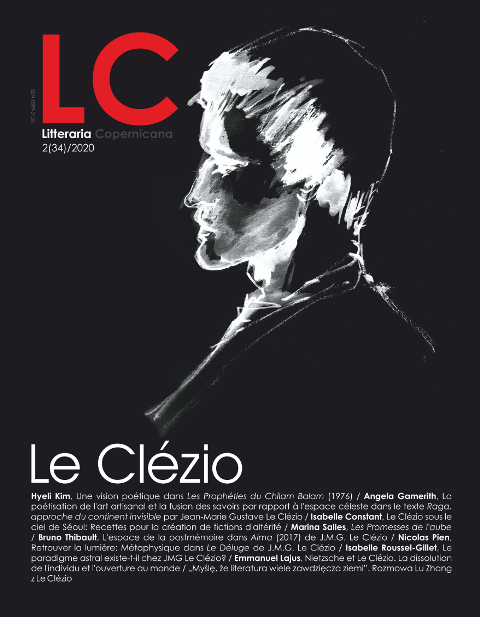L’espace de la postmémoire dans "Alma" (2017) de J.M.G. Le Clézio
DOI:
https://doi.org/10.12775/LC.2020.023Słowa kluczowe
postmémoire, esclavage, ciel étoilé, réalisme magique, récit indécidableAbstrakt
Peut-on véritablement se mettre dans la peau d’un autre, c’est-à-dire à la place d’un autre? Alma est un roman construit sur deux parcours opposés et deux voix entrecroisées, et curieusement sur une rencontre qui n’a pas vraiment eu lieu. Jérémie Felsen fait résonner le sanglot de l’homme blanc dans le texte : son séjour sur l’île Maurice se transforme très vite en une enquête sur l’histoire de sa famille, les plantations sucrières d’antan et la question de l’esclavage. Doublant la voix de Jérémie s’élève la voix sourde, incohérente mais incessante de Dodo, le clochard qui hante les cimetières. Cette voix dit la misère, la solitude, le racisme, le traumatisme, l’errance et l’exclusion dans l’île Maurice aujourd’hui, mais aussi en France. L’analyse détaillée des expériences de ces deux personnages nous permettra d’insister sur leur rencontre avec le réel – par-delà les clichés touristiques – mais aussi sur leur rencontre avec le ciel étoilé d’où le thème de l’extase chamanique. Dans notre conclusion, nous montrerons comment le réalisme magique leclézien produit un récit indécidable.
Is it really possible to put oneself in someone's shoes, in other words entirely in someone else's place? Alma is a novel constructed on two divergent paths and two interconnected voices, and rather oddly on a meeting which never actually took place. Jérémie Felsen makes the text resonate with the sobs of the white man: his stay on the island of Mauritius is quickly transformed into an investigation of his family history, the sugar plantations of the past and the issue of slavery. A hollow voice doubles Jérémie's: the incoherent yet incessant voice of Dodo, the vagrant who haunts the cemeteries. This voice expresses the misery, the solitude, the racism and the exclusion which exist not only on the island of Mauritius today, but also in France. The detailed analysis of the experiences of these two characters will highlight their encounter with the real world – beyond the tourist clichés – but also their encounter with the starry skies (i.e. the theme of shamanic ecstasy). In our conclusion, we will show how leclézian magic realism produces an ambiguous narrative.
Bibliografia
Blanckeman, Bruno 2000. Les Récits indécidables: Jean Echenoz, Hervé Guibert, Pascal Quignard. Villeneuve d’Ascq: Presses Universitaires du Septentrion.
Bruckner, Pascal 1983. Le Sanglot de l’homme blanc: Tiers Monde, culpabilité, haine de soi. Paris: Seuil / L’Histoire immédiate.
Hirsch, Marianne 1997. Family Frames: Photography, Narrative, and Postmemory. Cambridge: Harvard University Press.
Hirsch, Marianne 2014. “Postmémoire”. Traduit par Philippe Mesnard. Témoigner: entre histoire et mémoire 118: 205–206.
Imbert, Jean-Philippe 1997. “J.M.G. Le Clézio, Writer of Exile in Désert and Étoile errante”. In: Anthony Coulson (ed.). Exiles and Migrants: Crossings Thresholds in European Society. Brighton: Sussex Academic Press.
Jean-François, Emmanuel Bruno 2019. “Mémoire, corps et errance dans Alma de J.-M. G. Le Clézio”. In : Justine Feyereisen [&] Paul Dirkx (dirs.). Corps. Les Cahiers J.-M.G. Le Clézio 12: 157–182.
Kelly, Van 2018. “Mapping Self and/as Other: Attempts to Fuse Horizons in Modiano and Le Clézio”. Yale French Studies 133 (janvier): 39–57.
Landrot, Marine 2017. “Alma de J.M.G. Le Clézio”. Télérama 3534 (3 octobre 2017) : 36.
Le Clézio, Jean-Marie Gustave 2017. Alma. Paris : Gallimard.
Le Clézio, Jean-Marie Gustave 1992. Étoile errante. Paris : Gallimard.
Putnam, Walter 1998. “The Poetics and Politics of Space in J.-M.G. Le Clézio’s Étoile errante»”. In: E. Barkan et M.-D. Shelton (eds.). Borders, Exiles, Diasporas. Stanford: Stanford University Press.
Roussel-Gillet, Isabelle 2018. “Alma (2017) de J.-M.G. Le Clézio”. In : Sabrinelle Bedrane [&] Sophie Jollin-Bertocchi (dirs.). Romanesques, Romances. Les Cahiers Le Clézio 11 : 187–191. Passage(s).
Thibault, Bruno 2009. J.M.G. Le Clézio et la métaphore exotique. Amsterdam & New York : Éditions Rodopi.
Tritsmans, Bruno 1990. “Rêves de cartes: Récit et géométrie chez Gracq et Le Clézio”. Poétique 82 (avril): 165–177.
Pobrania
Opublikowane
Jak cytować
Numer
Dział
Statystyki
Liczba wyświetleń i pobrań: 991
Liczba cytowań: 0



